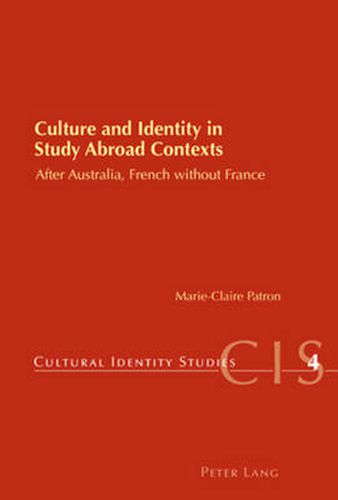Readings Newsletter
Become a Readings Member to make your shopping experience even easier.
Sign in or sign up for free!
You’re not far away from qualifying for FREE standard shipping within Australia
You’ve qualified for FREE standard shipping within Australia
The cart is loading…






This title is printed to order. This book may have been self-published. If so, we cannot guarantee the quality of the content. In the main most books will have gone through the editing process however some may not. We therefore suggest that you be aware of this before ordering this book. If in doubt check either the author or publisher’s details as we are unable to accept any returns unless they are faulty. Please contact us if you have any questions.
This book examines the effects of a study abroad experience on students’ culture and identity and the impact of these effects on their readjustment to their home culture. It explores issues of culture and identity from the perspective of French students studying in Australia. Issues of perceived cultural proximity between France and Australia, a relative lack of prior knowledge of the host country before the period of study and the impact of distance all influence aspects of these students’ experiences. Employing long-term and cross-sectional studies focusing on culture shock, reverse culture shock and cultural identity issues, the author investigates the cyclical journey of French academic sojourners and examines the impact of the acculturation and repatriation processes and the language experiences on their perceptions of cultural identity. Once the students had traversed the difficult stages of culture shock and reached the stage of full recovery (adjustment), they no longer wished to go home. What impact has this process had on the returnees who faced the insularity of their home society once they returned home? Is the French community beginning to acknowledge the start of a brain-drain of the educated French overseas? What are the implications for borderless higher education? What value should be placed on pre-departure preparation from participating institutions and the individuals themselves, both on a linguistic and a psychological level? This book poses questions relating to these issues.
$9.00 standard shipping within Australia
FREE standard shipping within Australia for orders over $100.00
Express & International shipping calculated at checkout
Stock availability can be subject to change without notice. We recommend calling the shop or contacting our online team to check availability of low stock items. Please see our Shopping Online page for more details.
This title is printed to order. This book may have been self-published. If so, we cannot guarantee the quality of the content. In the main most books will have gone through the editing process however some may not. We therefore suggest that you be aware of this before ordering this book. If in doubt check either the author or publisher’s details as we are unable to accept any returns unless they are faulty. Please contact us if you have any questions.
This book examines the effects of a study abroad experience on students’ culture and identity and the impact of these effects on their readjustment to their home culture. It explores issues of culture and identity from the perspective of French students studying in Australia. Issues of perceived cultural proximity between France and Australia, a relative lack of prior knowledge of the host country before the period of study and the impact of distance all influence aspects of these students’ experiences. Employing long-term and cross-sectional studies focusing on culture shock, reverse culture shock and cultural identity issues, the author investigates the cyclical journey of French academic sojourners and examines the impact of the acculturation and repatriation processes and the language experiences on their perceptions of cultural identity. Once the students had traversed the difficult stages of culture shock and reached the stage of full recovery (adjustment), they no longer wished to go home. What impact has this process had on the returnees who faced the insularity of their home society once they returned home? Is the French community beginning to acknowledge the start of a brain-drain of the educated French overseas? What are the implications for borderless higher education? What value should be placed on pre-departure preparation from participating institutions and the individuals themselves, both on a linguistic and a psychological level? This book poses questions relating to these issues.